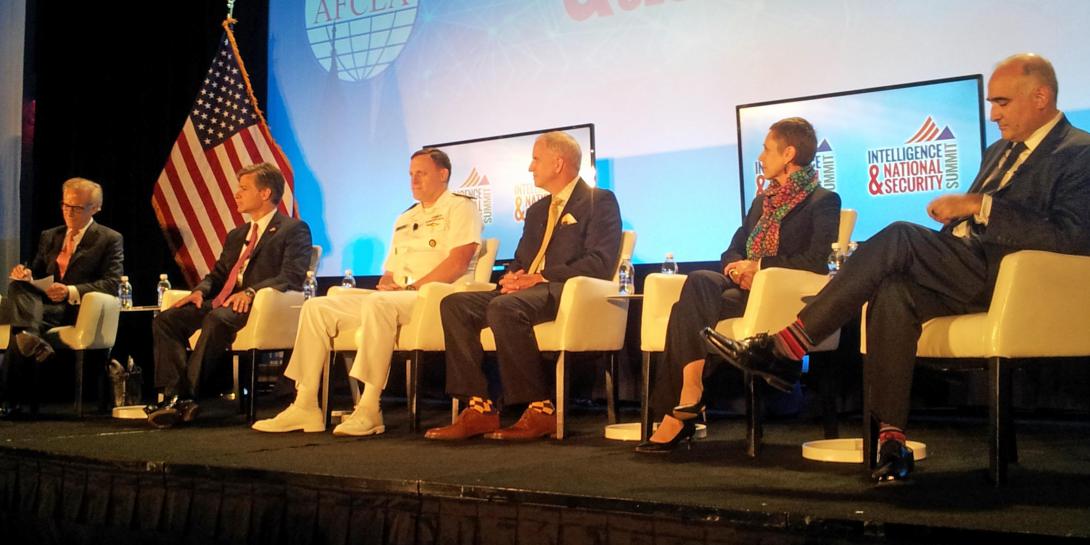Security vs. Privacy: A Looming Showdown in Congress
Officials from across the U.S. intelligence community are calling for reauthorization of section 702 of the Foreign Intelligence Surveillance Act, which allows the government to collect data on non-U.S. citizens on foreign soil, as Congress debates whether to reauthorize, reform or outright reject it.
Multiple officials from multiple agencies touted the benefits of Section 702 during the 2017 Intelligence and National Security Summit, which was held Sept. 6-7 in Washington, D.C.
Adm. Michael Rogers, USN, who heads both the National Security Agency and U.S. Cyber Command, said he expressed concern about 702 reauthorization to Vice President Mike Pence when the two met September 6. Adm. Rogers said he told the vice president, “Sir, if this was removed and not reauthorized I can’t overcome that. It generates a significant segment of NSA’s ability to generate insights on counterterrorism, counterproliferation, what nation states and other actors are doing.”
Adm. Rogers: It would be a truly significant act not in our best interest if we were to withdraw 702 authority #Intelligence2017
— George Seffers (@gseffers) September 7, 2017
Adm. Rogers reported that over the next few months he and others will be attempting to educate and inform Congress as its members try to make up their minds.
He acknowledged concerns that some privacy proponents have that Americans can be caught up in the massive data collection efforts. “There are very valid concerns, which I certainly understand. We go to great lengths to ensure the protection of our citizens’ privacy, and their rights. We acknowledge that in the course of the conduct of 702 we will undoubtedly run into U.S. personnel information, which is why we have put protections in place from a court of law,” Adm. Rogers said.
Those protections include oversight by Congress and the Foreign Intelligence Surveillance Court, also known as the FISA court, as well as restrictions on who can access the data and how it can be used. “We take that very seriously,” Adm. Rogers assured the audience. “It’s something we believe in.”
The admiral issued a dire warning. “It would be a truly significant act not in our nation’s best interest to withdraw the legal authority currently granted to us under section 702,” he said.
Sue Gordon, the newly appointed principal deputy director for national intelligence within the Office of the Director of National Intelligence, suggested intelligence officials engage in a conversation with the American public. “This whole security and privacy [issue] is too often set up as an oppositional thing. We’re on the same side. People in the government swear to uphold and defend the Constitution of the United States, which is predicated on the notion of individual rights and privacy,” she stated. “There’s much more common ground than we presume.”
Gordon, @ODNIgov Is nothing more important for IC for the rest of the year than renewing 702 authority.#Intelligence2017
— George Seffers (@gseffers) September 7, 2017
Gordon listed 702 reauthorization as the top priority for the intelligence community. “I don’t think there’s anything more important between now and the end of the year than to get it continued. It’s simply a capability that we know has great effect that we can’t replace any other way,” she said. “We’re confident that we have guidelines, procedures in place to protect the rights and privileges of the American populace, and we have to do this.”
The deputy director said the leaks by former NSA contractor Edward Snowden damaged the intelligence community’s credibility regarding 702. “In the aftermath of Snowden, too many people think that this is just putting huge segments of the American population at risk into getting sucked up into some great abyss that people can just go off and search. That is not the case at all,” she declared.
She described 702 as a very simple program. “It allows you to target non-U.S. persons who are credibly believed to be outside the United States for the purpose of foreign intelligence. That’s it,” she said, adding that the intelligence community must have a valid reason for targeting someone and that most Americans are not at risk. “If you’re not talking to one of those [targeted] people, you are not in existence in this world,” she stated.
Tom Bossert, homeland security advisor to Donald Trump, also stressed the need for 702, adding that the administration will see reauthorization from Congress. Bossert predicted increasingly tech-centered generations will dismiss the kinds of privacy concerns being voiced about 702. “Think about how odd it will sound to our grandchildren that we have to have a conversation about where our data is stored,” Bossert said.
Rep. Adam Schiff (D-CA) expressed confidence 702 will be reauthorized, but he hinted changes might be made. “I think we will reauthorize it, it’s just a question of what kind of reforms we make to it,” Schiff said, adding that not reauthorizing 702 would be “irresponsible.”
Schiff also said he is confident the courts and Congress can effectively oversee 702 data collection efforts. He also stressed that the agencies do “self-report” when they encounter privacy breaches. “I think the combination of what the courts do in their oversight, what we do in our oversight, and what the agencies do with their self reporting is comprehensive and working,” he concluded.





Comments